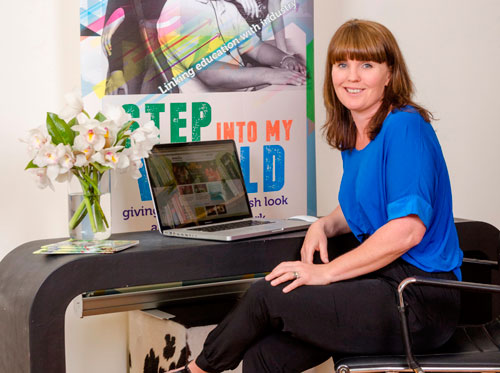Smart Connections
Mobile ‘smarts’, ultrafast broadband; near field communication; tailored voice and data plans; converged network services – Kevin Kevany has been catching up with the latest developments in business communications.
Mobile ‘smarts’, ultrafast broadband; near field communication; tailored voice and data plans; converged network services – Kevin Kevany has been catching up with the latest developments in business communications.
What would you say if you were told, by 2020, you could buy a smart device for $20, an unlimited mobile plan for $20-a-month, and your business would need just 20 minutes to build an enterprise app?
How about a major bank deciding to save local SMEs (small and medium businesses) from the often tricky and usually expensive decision on strategic software choices and provide them (free or drastically reduced; in some cases whether or not you are a customer) as part of focusing on the most important players in the economy; you and your fellow SMEs.
Or Vodafone and 2degrees Mobile scurrying to your doorstep or screen with more of what you need than just simply want, with a flexibility and applicability you could only have dreamt about in those dark early days of ‘take it, or leave it’.
Add entrepreneurial operations like Compass Communications and Digital Island bringing the power and quality of business quality VoIP, while Kordia has found a renaissance in offering SIP (Session Initiation Protocol) and Desk2Desk communications to 20-plus employee enterprises.
Denis O’Shea, CEO of Mobile Mentor, the man behind all of these forecasts, has been sharing his ‘2020 vision’ at a number of leading communications’ events in Australasia in recent months, and yes, it did raise a few eyebrows.
“Because, together with BYOD (Bring Your Own Device), these trends will mean that mobility becomes very affordable and will facilitate ‘mobility for the masses’.”
Mobility will transform many roles in the service sector, primary industries and healthcare – by improving information collection, decision-making and collaboration, he says.
“Essentially everyone becomes a knowledge worker. The benefits to our staff, companies, government departments and our economy will be significant.
“It’s been said before, much like the Internet 20 years ago, mobility is a game changer – it provides an opportunity to create a competitive advantage. And when business models change, it is not the big eating the small; it’s the fast who eat the slow,” says O’Shea.
Telcos lead the charge
On the telco front Vodafone is one of the first out of the blocks with their first offering delivered over ultrafast broadband. Office Net offers an integrated fixed and mobile solution, with features focused on reducing business IT infrastructure costs – while ‘ensuring you never miss a call’.
Being scalable, it allows you to simply add and remove lines to suit; minute packs and data; and services like voicemail and even good old-fashioned fax.
“Office Net Hosted provides advanced calling features such as ‘hunt groups’ which direct calls to the first available number, and simultaneous calling, where a call can be directed to both a mobile and a landline,” says Vodafone’s SME head, Andrew Fairgray. “These cloud-based solutions remove the need for businesses to invest in expensive PABX equipment, and offer benefits such as remote data storage.” He makes the point that business owner managers can now get all the landline, broadband, PABX and mobile calling services they require from a single provider – with one, easy-to-manage plan on a single bill.
“The importance of businesses being able to answer calls can’t be underestimated. Research shows around 78 percent of all business goes to the first company to pick up the phone,” says Fairgray.
All the packages can be customised and are scalable, including free group calling between landlines and eligible Vodafone mobiles.
Weeks earlier, Vodafone had introduced SmartPass, or what it called ‘a new wave of mobile payment that will shrink the contents of Kiwi pockets and handbags’. It is designed to ‘take the stress out of shopping, and let customers make convenient, everyday purchases with a simple wave of a smartphone’.
While the hospitality trade, Boxing Day sales and large events are expected to be the major thrust of these devices, they do represent the beginning of the next phase in simplified cash transactions and the consolidation of digital devices and payment platforms. There are bound to be opportunities for SME innovation too. If you need inspiration, just listen to Matt Williams, Vodafone’s consumer director.
“A key advantage of a mobile wallet is your phone is the only thing you need to lay your hands on before leaving the house. Contactless Near Field Communication (NFC) payments globally are estimated to reach more than $36 billion in 2017 and we expect to see NFC smartphones eventually replacing all the cards we carry in our wallets right now.”
Caroline Ada, Visa’s country manager New Zealand and South Pacific, agrees and goes even further: “We want consumers to be able to use mobile technology to pay, get paid and better manage their finances, while getting all the benefits of Visa – convenience, security, reliability and global acceptance.”
It’s in that area of ‘getting paid’ where businesses might well focus their thinking.
Matt Williams notes that along with Visa and BNZ, Vodafone is engaged in intensive trials and testing over the next few months to ensure ‘the highest standards of security with simple functionality and convenience for customers’.
Degrees of difference
Charlene White, external communications manager, 2degrees Mobile, believes her company is up there with the competition when it comes to technology and pricing for SMEs.
“However, there are some other significant ways we differ from the competition. Firstly, our ‘Carry Over’ and ‘Shared Data’ offerings allow customers to carry over their unused minutes and data – and share their data with other people or devices. You get to use what you have paid for, rather than losing unused minutes/data at the end of each month. No other network in New Zealand offers this.
“Secondly, we reward all customers (new and existing) with new products as they are introduced rather than differentiate between them like other networks do. An example of this was when we introduced our carry over minutes and data plans, they were for all new and existing customers,” she says, noting 2degrees charges in arrears rather than upfront, “to give more visibility into monthly spending.”
The just launched ‘Spend Control’ facility allows you to set a limit on the amount you want to spend each month, thereby eliminating ‘overages and bill shock’. Shared Data lets customers share a data allocation with other people or devices with a 2degrees SIM card, eliminating and simplifying the need and cost of managing multiple data plans.
A very popular feature is Call & Text Australia, allowing customers to phone and text Australia at no extra cost, using their existing plan minutes and texts. And 2degrees offers a locally-based 24/7 customer care service.
Charlene White is proud of the tailored offerings the company provides to the local SME market and their focus on helping customers to contain costs, but points to their often-overlooked achievements.
“We are being regularly recognised for our superior customer service and overall performance. We were recently awarded the Roy Morgan ‘Mobile provider of the year’ award for the second year running, and earlier this year, Consumer Magazine ‘Best Mobile Provider’.”
And then there’s fibre
“The Internet solution that is best for your business really comes down to the number of your Internet users, and type of use. Thinking long-term and the future; fibre needs to be the end-goal and should be seen as an investment for your business.” This advice from Blair Stewart, GM of Digital Island, a 100 percent Kiwi-owned business telco.
“The average SME employee spends nearly ten minutes daily waiting for files and websites to download. That is more than an extended working-week a year! And that’s not even counting the time spent rebooting after the downloaded file freezes your computer,” says Stewart.
“Fibre will give your business really fast Internet, but it also makes a number of things possible for your business, which will have an impact on cost, productivity and competitiveness – quality video-conferencing (saving travel costs); faster file sharing; online backup and disaster recovery; and remote home-working capabilities – to name a few,” he says.
Digital Island broadband costs, depending on your connection (ADSL, VDSL, UFB and Premium Fibre) range from $39 to $1,049 a month.
Kevin Kevany is an Auckland-based freelance writer.
Email [email protected]
Choose a specialist business Internet provider
“Today, virtually every business is reliant on the Internet. But for too many local SMEs their Internet provider spends most of its time meeting residential demand,” says Drew Gilpin, Kordia Connect director sales and marketing.
“Come 3.30 pm in term time and their service and speed slumps as the kids get onboard. “Even the fastest broadband can be crawlingly slow when something goes wrong – especially when your ISP is not the telco that owns the infrastructure.
“For reliable cloud computing – say accounting and payroll solutions; video conferencing; company-grade backup; restore and data storage services – to deliver on their promise they have to work without interruption, ‘jitter’ or delay, all the time, suitably fast.
“Residential Internet is delivered on the basis that it is ‘not an essential service’ and in line with the concept of ‘best efforts’. You may have signed up for a 15mbps (megabits per second) line, but you will rarely, if ever, experience that speed.
“Try it for yourself at www.speedtest.net,” suggests Gilpin.
“If your Internet service isn’t performing, your employees aren’t either. A business service provider provides service level agreements (SLAs), bandwidth guarantees, none of the dreaded ‘caps’ and the sort of attention that reflects its understanding of how critical the Internet is to the business.
Voice, for example, especially based on Session Initiation Protocol (SIP), is cheaper and just as good, while you get access to a fully-featured PBX solution for a fraction of the price.
Kordia Connect is a converged network service enabling medium enterprises to access Internet and voice services ‘over a single, dedicated, high quality, scalable connection.
“We turn the traditional ISP/service provider relationship on its head,” says Gilpin, “ensuring the business is linked directly to the network rather than through an Internet service provider.
“Put simply, it means extra convenience, extra efficiency and extra flexibility for the business. That’s because the Internet and voice services run through a single dedicated and scalable Kordia connection, instead of multiple connections,” Gilpin says.
Kordia, an SOE of 60 year’s standing, having begun life as a broadcast transmission business, has invested heavily over recent years in becoming a full-scale telecommunications provider focusing on ‘delivering a higher level of quality assurance to the business market’.
Kordia is certified for Microsoft Lync.
Is VoIP business ready?
Voice-over-IP for many years had the stigma of cheap, nasty and unprofessional attached to it. Compass Communications has been hard at work changing that perception and making large inroads in the local SME market.
“Running a business of any size requires having a phone system you can trust,” says Peter White, their business markets manager, “without it resulting in garbled conversations, especially during peak Internet hours.
“The answer is down to quality. A lot of VoIP solutions are not ready for business use. Any properly installed VoIP system, by a company which knows what it is doing, will prioritise voice over all other data.
“We will only install a phone system if we have checked out the infrastructure and can guarantee call quality; this ensures crystal clear voice clarity at all hours of the day,” White says.
Compass believes VoIP now delivers a multitude of features, previously only possible in the most expensive of phone systems.
“Call recording; conference calling; pairing your DDI with your mobile phone; or even having employees working from home, but still using the business phone system – these are just a few of the features now accessible for SMEs,” says White.
“Five years ago these were features only large businesses could afford and now they are part of the day-to-day operations of SMEs throughout the country. Voice-over-IP, when implemented correctly, is making business more streamlined, dynamic and productive. It is another worldwide SME trend.”



